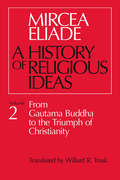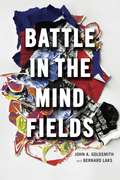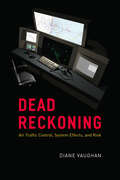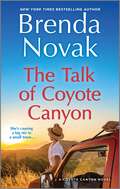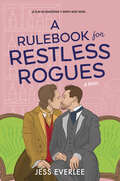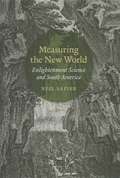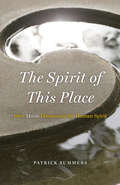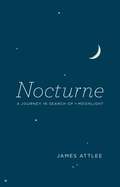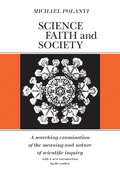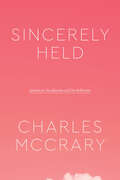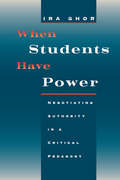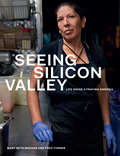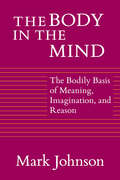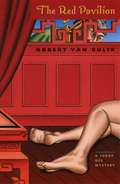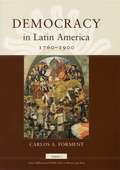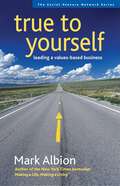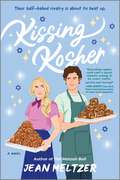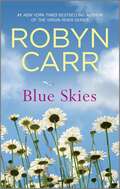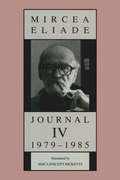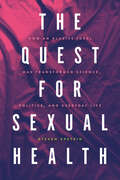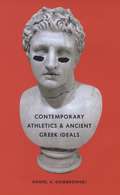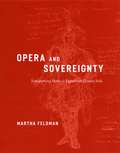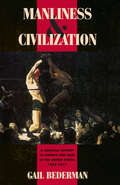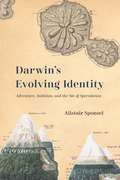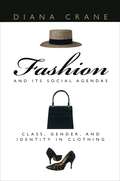- Table View
- List View
A History of Religious Ideas, Volume 2: From Gautama Buddha to the Triumph of Christianity
by Mircea EliadeIn volume 2 of this monumental work, Mircea Eliade continues his magisterial progress through the history of religious ideas. The religions of ancient China, Brahmanism and Hinduism, Buddha and his contemporaries, Roman religion, Celtic and German religions, Judaism, the Hellenistic period, the Iranian syntheses, and the birth of Christianity—all are encompassed in this volume.
Battle in the Mind Fields
by John A. Goldsmith Bernard Laks“We frequently see one idea appear in one discipline as if it were new, when it migrated from another discipline, like a mole that had dug under a fence and popped up on the other side.” Taking note of this phenomenon, John Goldsmith and Bernard Laks embark on a uniquely interdisciplinary history of the genesis of linguistics, from nineteenth-century currents of thought in the mind sciences through to the origins of structuralism and the ruptures, both political and intellectual, in the years leading up to World War II. Seeking to explain where contemporary ideas in linguistics come from and how they have been justified, Battle in the Mind Fields investigates the porous interplay of concepts between psychology, philosophy, mathematical logic, and linguistics. Goldsmith and Laks trace theories of thought, self-consciousness, and language from the machine age obsession with mind and matter to the development of analytic philosophy, behaviorism, Gestalt psychology, positivism, and structural linguistics, emphasizing throughout the synthesis and continuity that has brought about progress in our understanding of the human mind. Arguing that it is impossible to understand the history of any of these fields in isolation, Goldsmith and Laks suggest that the ruptures between them arose chiefly from social and institutional circumstances rather than a fundamental disparity of ideas.
Dead Reckoning: Air Traffic Control, System Effects, and Risk
by Diane VaughanVaughan unveils the complicated and high-pressure world of air traffic controllers as they navigate technology and political and public climates, and shows how they keep the skies so safe. When two airplanes were flown into the World Trade Center towers on September 11, 2001, Americans watched in uncomprehending shock as first responders struggled to react to the situation on the ground. Congruently, another remarkable and heroic feat was taking place in the air: more than six hundred and fifty air traffic control facilities across the country coordinated their efforts to ground four thousand flights in just two hours—an achievement all the more impressive considering the unprecedented nature of the task. In Dead Reckoning, Diane Vaughan explores the complex work of air traffic controllers, work that is built upon a close relationship between human organizational systems and technology and is remarkably safe given the high level of risk. Vaughan observed the distinct skill sets of air traffic controllers and the ways their workplaces changed to adapt to technological developments and public and political pressures. She chronicles the ways these forces affected their jobs, from their relationships with one another and the layouts of their workspace to their understanding of their job and its place in society. The result is a nuanced and engaging look at an essential role that demands great coordination, collaboration, and focus—a role that technology will likely never be able to replace. Even as the book conveys warnings about complex systems and the liabilities of technological and organizational innovation, it shows the kinds of problem-solving solutions that evolved over time and the importance of people.
The Talk of Coyote Canyon: A Novel (Coyote Canyon #2)
by Brenda NovakShe&’s not here to make friends. She&’s here to make trouble.With her piercings, tattoos and spiky blond hair, Ellen Truesdale doesn&’t quite fit in with the other folks in Coyote Canyon—and that&’s just fine with her. She&’s only here to put her father out of business, as payback for abandoning her when she was young.Or is she more interested in finally proving that she was worth keeping?Either way, she&’s struggling to keep her rival well-drilling company afloat. And being a single woman in a male-dominated field has started to take a toll. So when Hendrix Durrant steps in to help, Ellen has no choice but to let him—even though he happens to be her father&’s business partner and therefore her enemy. But the closer she works with him, the more she sees what she&’s been missing…in life and love. And once she lets go of her anger long enough to learn the truth about her past, she might just find the family she&’s always wanted.Coyote CanyonBook 1: Talulah's Back in TownBook 2: The Talk of Coyote CanyonBook 3: The Messy Lives of Jane Tanner
A Rulebook for Restless Rogues: A Victorian Romance (Lucky Lovers of London #2)
by Jess EverleeA PASTE MUST-READ ROMANCE BOOK OF 2023&“Readers will want to savor every word of Everlee&’s splendid debut, the launch of her Lucky Lovers of London series, like a fine vintage wine.&”—Booklist, on The Gentleman's Book of VicesJess Everlee follows up her sparkling debut The Gentleman's Book of Vices with this charming queer historical romp, in which two lifelong best friends find romance as they join forces to save the one place where they can truly be themselves.London, 1885David Forester and Noah Clarke have been best friends since boarding school. All grown up now, clever, eccentric Noah is Savile Row&’s most promising young tailor, while former socialite David runs an underground queer club, The Curious Fox.Nothing makes David happier than to keep the incense lit, the pianist playing and all his people comfortable, happy and safe until they stumble out into the dawn. But when the unscrupulous baron who owns the Fox moves to close it, David&’s world comes crashing down.Noah&’s never feared a little high-stakes gambling, but as he risks his own career in hopes of helping David, he realizes two things:One: David has not been honest about how he ended up at The Curious Fox in the first place.Two: Noah&’s feelings for David have become far more than friendly.What future lies beyond those first furtive kisses? Noah and David can hardly wait to find out…if they can untangle David from his web of deception without losing everything Noah has worked for.Lucky Lovers of LondonBook 1: The Gentleman's Book of VicesBook 2: A Rulebook for Restless Rogues
Measuring the New World: Enlightenment Science and South America
by Neil SafierPrior to 1735, South America was terra incognita to many Europeans. But that year, the Paris Academy of Sciences sent a mission to the Spanish American province of Quito (in present-day Ecuador) to study the curvature of the earth at the Equator. Equipped with quadrants and telescopes, the mission’s participants referred to the transfer of scientific knowledge from Europe to the Andes as a “sacred fire” passing mysteriously through European astronomical instruments to observers in South America.By taking an innovative interdisciplinary look at the traces of this expedition, Measuring the New World examines the transatlantic flow of knowledge from West to East. Through ephemeral monuments and geographical maps, this book explores how the social and cultural worlds of South America contributed to the production of European scientific knowledge during the Enlightenment. Neil Safier uses the notebooks of traveling philosophers, as well as specimens from the expedition, to place this particular scientific endeavor in the larger context of early modern print culture and the emerging intellectual category of scientist as author.
The Spirit of This Place: How Music Illuminates the Human Spirit (The\rice University Campbell Lectures)
by Patrick SummersArtists today are at a crossroads. With funding for the arts and humanities endowments perpetually under attack, and school districts all over the United States scrapping their art curricula altogether, the place of the arts in our civic future is uncertain to say the least. At the same time, faced with the problems of the modern world—from water shortages and grave health concerns to global climate change and the now constant threat of terrorism—one might question the urgency of this waning support for the arts. In the politically fraught world we live in, is the “felt” experience even something worth fighting for? In this soul-searching collection of vignettes, Patrick Summers gives us an adamant, impassioned affirmative. Art, he argues, nurtures freedom of thought, and is more necessary now than ever before. As artistic director of the Houston Grand Opera, Summers is well positioned to take stock of the limitations of the professional arts world—a world where the conversation revolves almost entirely around financial questions and whose reputation tends toward elitism—and to remind us of art’s fundamental relationship to joy and meaning. Offering a vehement defense of long-form arts in a world with a short attention span, Summers argues that art is spiritual, and that music in particular has the ability to ask spiritual questions, to inspire cathartic pathos, and to express spiritual truths. Summers guides us through his personal encounters with art and music in disparate places, from Houston’s Rothko Chapel to a music classroom in rural China, and reflects on musical works he has conducted all over the world. Assessing the growing canon of new operas performed in American opera houses today, he calls for musical artists to be innovative and brave as opera continues to reinvent itself. This book is a moving credo elucidating Summers’s belief that the arts, especially music, help us to understand our own humanity as intellectual, aesthetic, and ultimately spiritual.
Nocturne: A Journey in Search of Moonlight
by James Attlee“Nobody who has not taken one can imagine the beauty of a walk through Rome by full moon,” wrote Goethe in 1787. Sadly, the imagination is all we have today: in Rome, as in every other modern city, moonlight has been banished, replaced by the twenty-four-hour glow of streetlights in a world that never sleeps. Moonlight, for most of us, is no more. So James Attlee set out to find it. Nocturne is the record of that journey, a traveler’s tale that takes readers on a dazzling nighttime trek that ranges across continents, from prehistory to the present, and through both the physical world and the realms of art and literature. Attlee attends a Buddhist full-moon ceremony in Japan, meets a moon jellyfish on a beach in Northern France, takes a moonlit hike in the Arizona desert, and experiences a lunar eclipse on New Year’s Eve atop the snowbound Welsh hills. Each locale is illuminated not just by the moonlight he seeks, but by the culture and history that define it. We learn about Mussolini’s pathological fear of moonlight; trace the connections between Caspar David Friedrich, Rudolf Hess, and the Apollo space mission; and meet the inventors of the Moonlight Collector in the American desert, who aim to cure all kinds of ailments with concentrated lunar rays. Svevo and Blake, Whistler and Hokusai, Li Po and Marinetti are all enlisted, as foils, friends, or fellow travelers, on Attlee’s journey. Pulled by the moon like the tide, Attlee is firmly in a tradition of wandering pilgrims that stretches from Basho to Sebald; like them, he presents our familiar world anew.
Science, Faith and Society: A searching examination of the meaning and nautre of scientific inquiry
by Michael PolanyiIn its concern with science as an essentially human enterprise, Science, Faith and Society makes an original and challenging contribution to the philosophy of science. On its appearance in 1946 the book quickly became the focus of controversy. Polanyi aims to show that science must be understood as a community of inquirers held together by a common faith; science, he argues, is not the use of "scientific method" but rather consists in a discipline imposed by scientists on themselves in the interests of discovering an objective, impersonal truth. That such truth exists and can be found is part of the scientists' faith. Polanyi maintains that both authoritarianism and scepticism, attacking this faith, are attacking science itself.
Sincerely Held: American Secularism and Its Believers (Class 200: New Studies In Religion Ser.)
by Charles McCraryA novel account of the relationship between sincerity, religious freedom, and the secular in the United States. “Sincerely held religious belief” is now a common phrase in discussions of American religious freedom, from opinions handed down by the US Supreme Court to local controversies. The “sincerity test” of religious belief has become a cornerstone of US jurisprudence, framing what counts as legitimate grounds for First Amendment claims in the eyes of the law. In Sincerely Held, Charles McCrary provides an original account of how sincerely held religious belief became the primary standard for determining what legally counts as authentic religion. McCrary skillfully traces the interlocking histories of American sincerity, religion, and secularism starting in the mid-nineteenth century. He analyzes a diverse archive, including Herman Melville’s novel The Confidence-Man, vice-suppressing police, Spiritualist women accused of being fortune-tellers, eclectic conscientious objectors, secularization theorists, Black revolutionaries, and anti-LGBTQ litigants. Across this history, McCrary reveals how sincerity and sincerely held religious belief developed as technologies of secular governance, determining what does and doesn’t entitle a person to receive protections from the state. This fresh analysis of secularism in the United States invites further reflection on the role of sincerity in public life and religious studies scholarship, asking why sincerity has come to matter so much in a supposedly “post-truth” era.
When Students Have Power: Negotiating Authority in a Critical Pedagogy
by Ira ShorWhat happens when teachers share power with students? In this profound book, Ira Shor—the inventor of critical pedagogy in the United States—relates the story of an experiment that nearly went out of control. Shor provides the reader with a reenactment of one semester that shows what really can happen when one applies the theory and democratizes the classroom. This is the story of one class in which Shor tried to fully share with his students control of the curriculum and of the classroom. After twenty years of practicing critical teaching, he unexpectedly found himself faced with a student uprising that threatened the very possibility of learning. How Shor resolves these problems, while remaining true to his commitment to power-sharing and radical pedagogy, is the crux of the book. Unconventional in both form and substance, this deeply personal work weaves together student voices and thick descriptions of classroom experience with pedagogical theory to illuminate the power relations that must be negotiated if true learning is to take place.
Seeing Silicon Valley: Life inside a Fraying America
by Mary Beth Meehan Beth MeehanAcclaimed photographer Mary Beth Meehan and Silicon Valley culture expert Fred Turner join forces to give us an unseen view of the heart of the tech world. It’s hard to imagine a place more central to American mythology today than Silicon Valley. To outsiders, the region glitters with the promise of extraordinary wealth and innovation. But behind this image lies another Silicon Valley, one segregated by race, class, and nationality in complex and contradictory ways. Its beautiful landscape lies atop underground streams of pollutants left behind by decades of technological innovation, and while its billionaires live in compounds, surrounded by redwood trees and security fences, its service workers live in their cars. With arresting photography and intimate stories, Seeing Silicon Valley makes this hidden world visible. Instead of young entrepreneurs striving for efficiency in minimalist corporate campuses, we see portraits of struggle—families displaced by an impossible real estate market, workers striving for a living wage, and communities harmed by environmental degradation. If the fate of Silicon Valley is the fate of America—as so many of its boosters claim—then this book gives us an unvarnished look into the future.
The Body in the Mind: The Bodily Basis of Meaning, Imagination, and Reason
by Mark Johnson"There are books—few and far between—which carefully, delightfully, and genuinely turn your head inside out. This is one of them. It ranges over some central issues in Western philosophy and begins the long overdue job of giving us a radically new account of meaning, rationality, and objectivity."—Yaakov Garb, San Francisco Chronicle
The Red Pavilion: A Judge Dee Mystery (The Judge Dee Mysteries)
by Robert van GulikA chance encounter with Autumn Moon, the most powerful courtesan on Paradise Island, leads Judge Dee to investigate three deaths. Although he finally teases the true story from a tangled history of passion and betrayal, Dee is saddened by the perversion, corruption, and waste of the world "of flowers and willows" that thrives on prostitution.
Democracy in Latin America, 1760–1900: Civic Selfhood and Public Life in Mexico and Peru (Morality And Society Ser. #1)
by Carlos A. FormentCarlos Forment's aim in this highly ambitious work is to write the book that Tocqueville would have written had he traveled to Latin America instead of the United States. Drawing on an astonishing level of research, Forment pored over countless newspapers, partisan pamphlets, tabloids, journals, private letters, and travelogues to show in this study how citizens of Latin America established strong democratic traditions in their countries through the practice of democracy in their everyday lives. This first volume of Democracy in Latin America considers the development of democratic life in Mexico and Peru from independence to the late 1890s. Forment traces the emergence of hundreds of political, economic, and civic associations run by citizens in both nations and shows how these organizations became models of and for democracy in the face of dictatorship and immense economic hardship. His is the first book to show the presence in Latin America of civic democracy, something that gave men and women in that region an alternative to market- and state-centered forms of life. In looking beneath institutions of government to uncover local and civil organizations in public life, Forment ultimately uncovers a tradition of edification and inculcation that shaped democratic practices in Latin America profoundly. This tradition, he reveals, was stronger in Mexico than in Peru, but its basic outlines were similar in both nations and included a unique form of what Forment calls Civic Catholicism in order to distinguish itself from civic republicanism, the dominant political model throughout the rest of the Western world.
True to Yourself: Leading a Values-Based Business (false)
by Mark AlbionHow do you build the kind of company you've always wanted to work in--one that serves people and the planet while being financially successful, too? What do you do when you believe that business should serve the common good, but everyday business pressures--meeting payroll, battling competition, keeping customers and investors happy--are at a fever pitch? Leading a small business when you measure success more broadly than with a single financial bottom line is no easy task. True to Yourself is a practical guide to doing just that. It provides tools you can use to combine profit with purpose, margin with mission, value with values.
Kissing Kosher: A Novel
by Jean Meltzer"An unflinchingly honest romance." —Kirkus, starred reviewFrom the author of THE MATZAH BALL and MR. PERFECT ON PAPER comes this hilarious and emotional rivals-to-lovers romance.Step 1: Get the secret recipe. Step 2: Don&’t fall in love…Avital Cohen isn&’t wearing underpants—woefully, for unsexy reasons. Chronic pelvic pain has forced her to sideline her photography dreams and her love life. It&’s all she can do to manage her family&’s kosher bakery, Best Babka in Brooklyn, without collapsing.She needs hired help.And distractingly handsome Ethan Lippmann seems the perfect fit.Except Ethan isn&’t there to work—he&’s undercover, at the behest of his ironfisted grandfather. Though Lippmann&’s is a household name when it comes to mass-produced kosher baked goods, they don&’t have the charm of Avital&’s bakery. Or her grandfather&’s world-famous pumpkin spice babka recipe.As they bake side by side, Ethan soon finds himself more interested in Avital than in stealing family secrets, especially as he helps her find the chronic pain relief—and pleasure—she&’s been missing.But perfecting the recipe for romance calls for leaving out the lies…even if coming clean means risking everything.
Blue Skies
by Robyn CarrFrom the bestselling author of the hit Netflix series, Virgin RiverThree friends journey to discover the value of family, second chances, and choosing to live your best life in this fan-favorite romance by #1 New York Times bestselling author Robyn Carr.Nikki survived a terrible marriage and a worse divorce, but now suddenly has custody of her kids again. Dixie is through with looking for love when all she gets are expensive gifts and heartache. Carlisle is trying to move forward from a bad relationship that has destroyed his trust. When Nikki, Dixie and Carlisle are offered the chance to join a new airline in Las Vegas, they don&’t hesitate. With nothing to lose and everything to gain, these three friends are starting over in search of their own blue skies.Previously published.
Journal IV: 1979–1985
by Mircea EliadeJournal IV is the first publication, in a translation from the Romanian manuscript, of the journal that Mircea Eliade kept during the last seven years of his life. In this period, Eliade is ensconced as a famous scholar—his works are being translated into many languages and books about him arrive regularly in the mail. His encounters with scholars of like repute are recorded in the journal; after a party in Paris, Eliade shares a taxi with Claude Lévi-Strauss and inadvertently makes off with his raincoat. Running like a fault line through the peak of his success, however, is Eliade's painful awareness of his physical decline—failing vision, arthritic hands, and continual fatigue. Again and again he repeats how little time he has to finish the projects he is working on—his autobiography, the third and fourth volumes of his History of Religious Ideas, and the duties associated with his editorship of the Encyclopedia of Religion. He poignantly recounts the sharpest blow: the disorganization and eventual destruction by fire of his personal library. Within the scope of Journal IV Eliade and his world go to ruin. What does not decline is the vivid and persistent voice of Eliade the writer, an unbreaking voice that—with death only months away—plans a reply to critics, plots out an article, and ruminates on characters to people another novella.
The Quest for Sexual Health: How an Elusive Ideal Has Transformed Science, Politics, and Everyday Life
by Steven EpsteinOffering an entryway into the distinctive worlds of sexual health and a window onto their spillover effects, sociologist Steven Epstein traces the development of the concept and parses the debates that swirl around it. Since the 1970s, health professionals, researchers, governments, advocacy groups, and commercial interests have invested in the pursuit of something called "sexual health." Under this expansive banner, a wide array of programs have been launched, organizations founded, initiatives funded, products sold—and yet, no book before this one asks: What does it mean to be sexually healthy? When did people conceive of a form of health called sexual health? And how did it become the gateway to addressing a host of social harms and the reimagining of private desires and public dreams? Conjoining "sexual" with "health" changes both terms: it alters how we conceive of sexuality and transforms what it means to be healthy, prompting new expectations of what medicine can provide. Yet the ideal of achieving sexual health remains elusive and open-ended, and the benefits and costs of promoting it are unevenly distributed across genders, races, and sexual identities. Rather than a thing apart, sexual health is intertwined with nearly every conceivable topical debate—from sexual dysfunction to sexual violence, from reproductive freedom to the practicalities of sexual contact in a pandemic. In this book Steven Epstein analyzes the rise, proliferation, uptake, and sprawling consequences of sexual health activities, offering critical tools to assess those consequences, expand capacities for collective decision making, and identify pathways that promote social justice.
Contemporary Athletics & Ancient Greek Ideals
by Daniel A. DombrowskiDespite their influence in our culture, sports inspire dramatically less philosophical consideration than such ostensibly weightier topics as religion, politics, or science. Arguing that athletic playfulness coexists with serious underpinnings, and that both demand more substantive attention, Daniel Dombrowski harnesses the insights of ancient Greek thinkers to illuminate contemporary athletics. Dombrowski contends that the ideas of Plato, Aristotle, and Plotinus shed important light on issues—such as the pursuit of excellence, the concept of play, and the power of accepting physical limitations while also improving one’s body—that remain just as relevant in our sports-obsessed age as they were in ancient Greece. Bringing these concepts to bear on contemporary concerns, Dombrowski considers such questions as whether athletic competition can be a moral substitute for war, whether it necessarily constitutes war by other means, and whether it encourages fascist tendencies or ethical virtue. The first volume to philosophically explore twenty-first-century sport in the context of its ancient predecessor, Contemporary Athletics and Ancient Greek Ideals reveals that their relationship has great and previously untapped potential to inform our understanding of human nature.
Opera and Sovereignty: Transforming Myths in Eighteenth-Century Italy
by Martha FeldmanPerformed throughout Europe during the 1700s, Italian heroic opera, or opera seria, was the century’s most significant musical art form, profoundly engaging such figures as Handel, Haydn, and Mozart. Opera and Sovereignty is the first book to address this genre as cultural history, arguing that eighteenth-century opera seria must be understood in light of the period’s social and political upheavals. Taking an anthropological approach to European music that’s as bold as it is unusual, Martha Feldman traces Italian opera’s shift from a mythical assertion of sovereignty, with its festive forms and rituals, to a dramatic vehicle that increasingly questioned absolute ideals. She situates these transformations against the backdrop of eighteenth-century Italian culture to show how opera seria both reflected and affected the struggles of rulers to maintain sovereignty in the face of a growing public sphere. In so doing, Feldman explains why the form had such great international success and how audience experiences of the period differed from ours today. Ambitiously interdisciplinary, Opera and Sovereignty will appeal not only to scholars of music and anthropology, but also to those interested in theater, dance, and the history of the Enlightenment.
Manliness & Civilization: A Cultural History of Gender and Race in the United States, 1880–1917 (Women In Culture And Society Ser.)
by Gail BedermanWhen former heavyweight champion Jim Jeffries came out of retirement on the fourth of July, 1910 to fight current black heavywight champion Jack Johnson in Reno, Nevada, he boasted that he was doing it "for the sole purpose of proving that a white man is better than a negro." Jeffries, though, was trounced. Whites everywhere rioted. The furor, Gail Bederman demonstrates, was part of two fundamental and volatile national obsessions: manhood and racial dominance. In turn-of-the-century America, cultural ideals of manhood changed profoundly, as Victorian notions of self-restrained, moral manliness were challenged by ideals of an aggressive, overtly sexualized masculinity. Bederman traces this shift in values and shows how it brought together two seemingly contradictory ideals: the unfettered virility of racially "primitive" men and the refined superiority of "civilized" white men. Focusing on the lives and works of four very different Americans—Theodore Roosevelt, educator G. Stanley Hall, Ida B. Wells, and Charlotte Perkins Gilman—she illuminates the ideological, cultural, and social interests these ideals came to serve.
Darwin's Evolving Identity: Adventure, Ambition, and the Sin of Speculation
by Alistair SponselWhy—against his mentor’s exhortations to publish—did Charles Darwin take twenty years to reveal his theory of evolution by natural selection? In Darwin’s Evolving Identity, Alistair Sponsel argues that Darwin adopted this cautious approach to atone for his provocative theorizing as a young author spurred by that mentor, the geologist Charles Lyell. While we might expect him to have been tormented by guilt about his private study of evolution, Darwin was most distressed by harsh reactions to his published work on coral reefs, volcanoes, and earthquakes, judging himself guilty of an authorial “sin of speculation.” It was the battle to defend himself against charges of overzealous theorizing as a geologist, rather than the prospect of broader public outcry over evolution, which made Darwin such a cautious author of Origin of Species. Drawing on his own ambitious research in Darwin’s manuscripts and at the Beagle’s remotest ports of call, Sponsel takes us from the ocean to the Origin and beyond. He provides a vivid new picture of Darwin’s career as a voyaging naturalist and metropolitan author, and in doing so makes a bold argument about how we should understand the history of scientific theories.
Fashion and Its Social Agendas: Class, Gender, and Identity in Clothing
by Diana CraneIt has long been said that clothes make the man (or woman), but is it still true today? If so, how has the information clothes convey changed over the years? Using a wide range of historical and contemporary materials, Diana Crane demonstrates how the social significance of clothing has been transformed. Crane compares nineteenth-century societies—France and the United States—where social class was the most salient aspect of social identity signified in clothing with late twentieth-century America, where lifestyle, gender, sexual orientation, age, and ethnicity are more meaningful to individuals in constructing their wardrobes. Today, clothes worn at work signify social class, but leisure clothes convey meanings ranging from trite to political. In today's multicode societies, clothes inhibit as well as facilitate communication between highly fragmented social groups. Crane extends her comparison by showing how nineteenth-century French designers created fashions that suited lifestyles of Paris elites but that were also widely adopted outside France. By contrast, today's designers operate in a global marketplace, shaped by television, film, and popular music. No longer confined to elites, trendsetters are drawn from many social groups, and most trends have short trajectories. To assess the impact of fashion on women, Crane uses voices of college-aged and middle-aged women who took part in focus groups. These discussions yield fascinating information about women's perceptions of female identity and sexuality in the fashion industry. An absorbing work, Fashion and Its Social Agendas stands out as a critical study of gender, fashion, and consumer culture. "Why do people dress the way they do? How does clothing contribute to a person's identity as a man or woman, as a white-collar professional or blue-collar worker, as a preppie, yuppie, or nerd? How is it that dress no longer denotes social class so much as lifestyle? . . . Intelligent and informative, [this] book proposes thoughtful answers to some of these questions."-Library Journal
